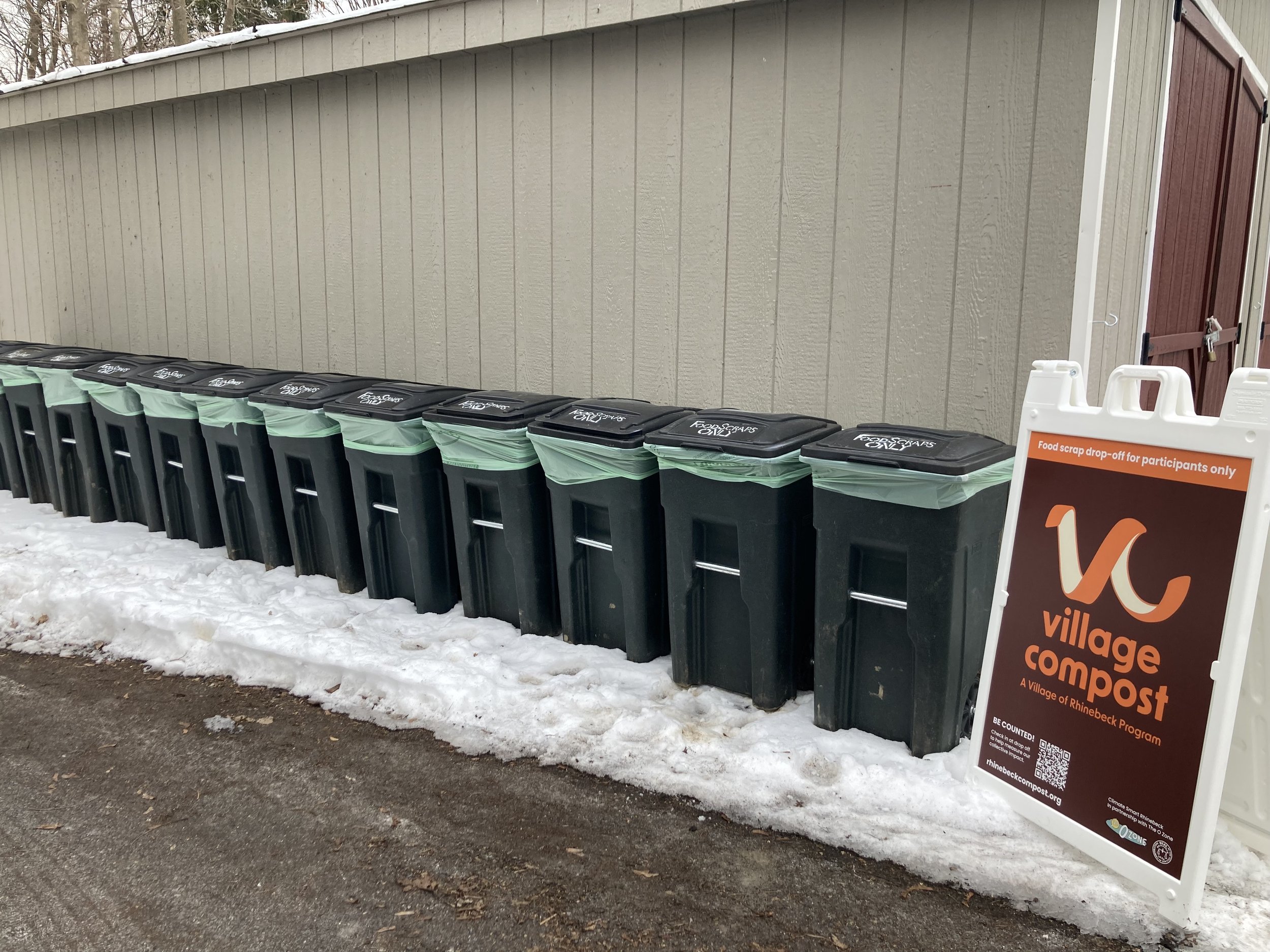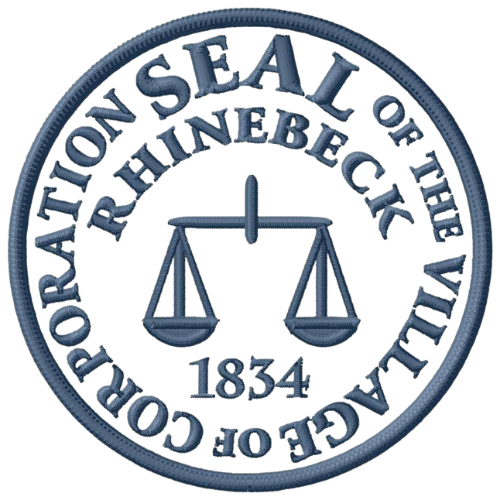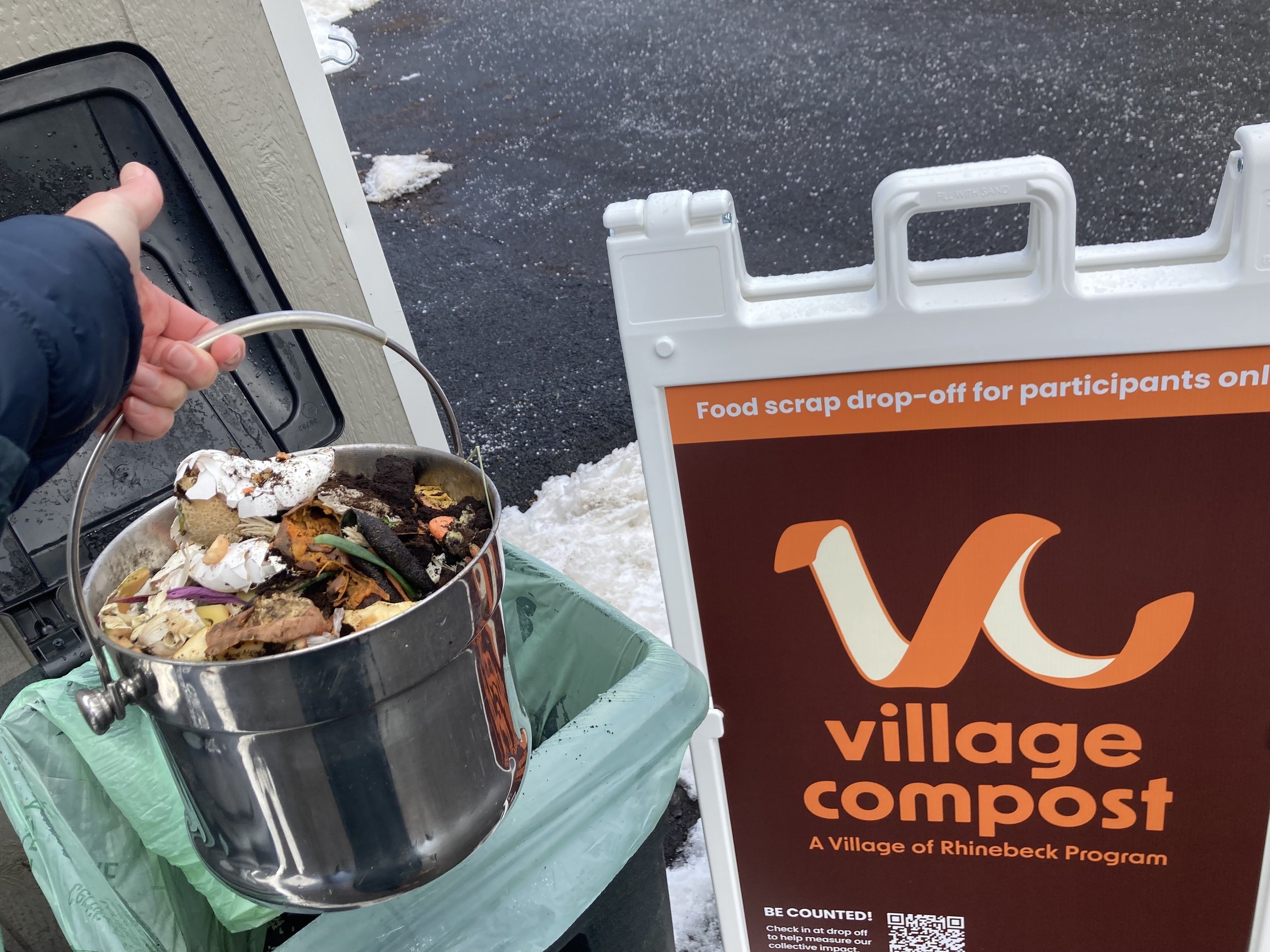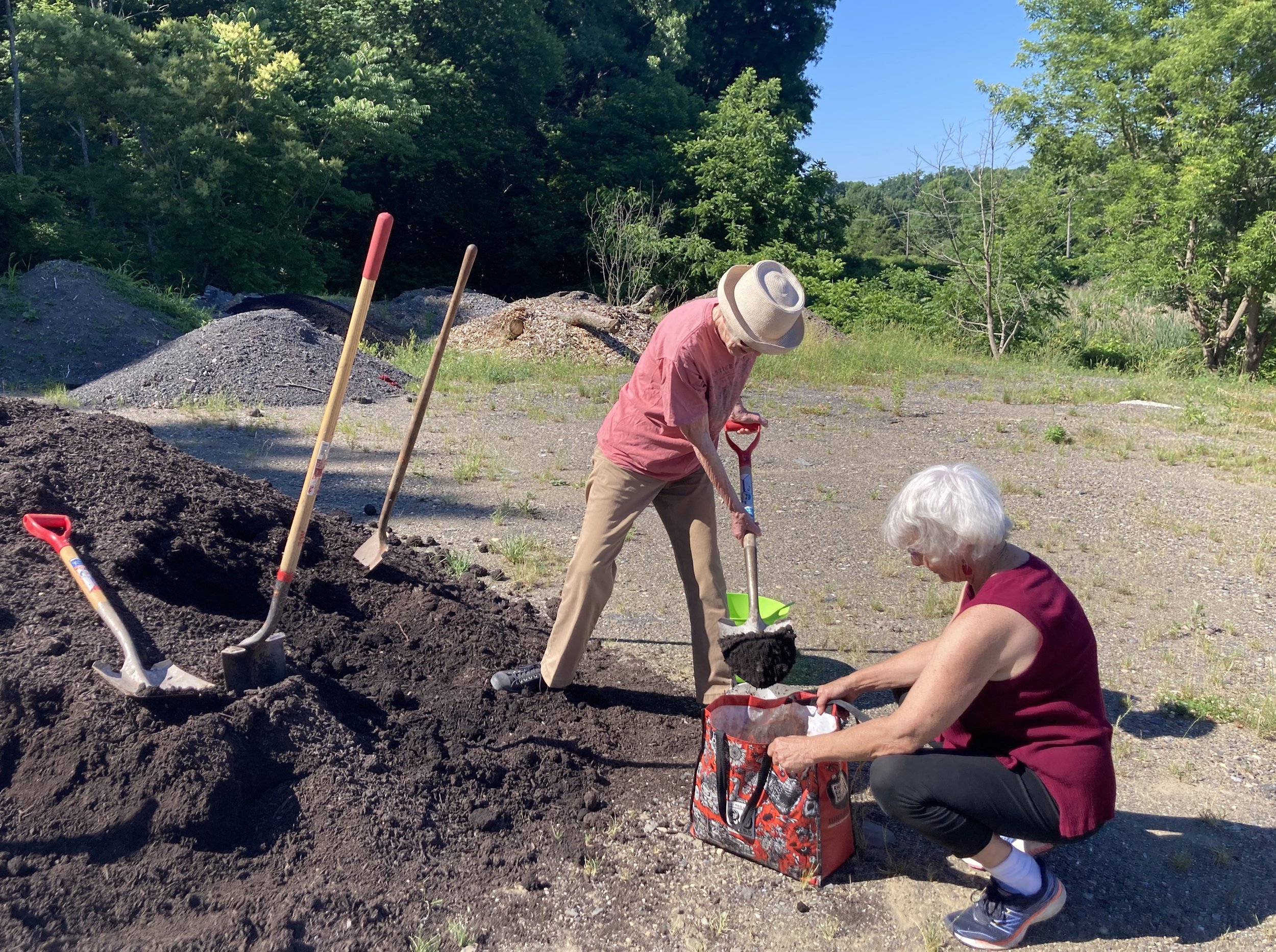Rhinebeck Village’s Compost Pilot & History of this Work
News
After an RFP process, the Village Board has signed an agreement with Ellerslie Stables, which will act as a subcontractor to manage composting at their farm. The farm will collect a load of food scraps from the Village center once a week. This means that additional truck traffic entering the farm due to the Village Compost program would be a once or twice a week delivery via the farmer’s truck. The program is planned to be free for all. The Village requested proposals from a farm that is already composting and where their compost site is set back from neighbors and wetlands (per DEC requirements).
The Village was awarded a $200,000 grant through the DEC’s “Municipal Food Scraps Recycling Initiatives” round of funding. The DEC has indicated that the Village could still use the $200,000 grant for site improvements and equipment at the farm to enable proper incorporation of food scraps per DEC regulations, such as adding an Aerated Static Pile system (ASP). (See more details on how ASP works below.) The creation of compost is considered a farming practice by the NY State Department of Agriculture and Markets.
In September 2023, the Village received one proposal from Michael Dicola of Ellerslie Stables. His existing compost site is located on his over 500 acre farm, where he composts manure and shavings from over 30 horse stalls. Michael has received DEC registration for his composting site to be able to receive approximately 2 tons of food scraps per week. The DEC Division of Materials Management oversees and regulates compost sites in NYS.
At the September 2023 Village Board meeting, the Village Board voted to accept this proposal. An agreement between Ellerslie Stables and the Village was signed in the New Year of 2024. In the fall of 2024, we got the final stamp of approval from NY State to start spending grant money and get the program rolling!
Blue dot showing the existing compost site at Ellerslie Stables
Aerated static pile (ASP) compost systems do not stink! When the pile is oxygenated, it heats the pile to 140 degrees F. This environment keeps microbes doing their work and does not lead to sulfur and methane, the chemicals that make food rotting in landfills stink. The hot temperatures also deter wildlife.
Here you can see Aleks Jagiello, who manages an ASP facility in Westchester, explaining the process for us on a visit to the site in the spring of 2023.
Background
A growing number of residents have inquired about composting their food scraps. We are joining the leading edge of municipalities, including our neighbors to the north in Red Hook, in recognizing the benefits of compost programs.
March 1 - Dec 31, 2022: Village Compost, the Village of Rhinebeck’s municipal compost pilot. Enabled 100 households + 6 businesses to divert 2 tons of food scraps per month. CO2e reduced by 4 tons per month = 10 cars off the road!
January 2023: Village government gets two grants totaling $300,000 to construct a municipal composting facility at the Village Highway Department property. Compost process will be a special aerated static pile system (ASP), using the leaves and brush gathered through yard waste mulching and the equipment already on site. Village engineering firm, Tighe & Bond, created a proposal with an estimated budget.
February - present: Town Planning Board approval process. We presented to the Town Planning Board on March 6 (see materials here and here). Public hearing held on April 3 at Town Hall. The public hearing period extended to May 1 (County permit approved. Trustee Bertozzi’s update).
May 2023 - The Village Board withdraws its application before the Town Planning Board due to pushback from neighbors and the Town’s alignment with those neighbors. PDF of Trustee Bertozzi’s letter to the Town Planning Board.
August 2023 - The Village Board releases a Request for Proposals for farms located within 4miles of the Village Center to subcontract for municipal composting.
September 2023 - Trustee Bertozzi brings a vote to the Village Board to accept a proposal from Michael Decola of Ellerslie Stable to subcontract for composting
February 2024 - Agreement between Ellerslie Stables and Village Board is finalized
September 2024 - Final approval from NY State to start spending the DEC grant money
December 2024 - The Village launches the food scrap drop off spot in the municipal parking lot and the program commences
The Scrapped Village Highway Department Plan
Here you see a preliminary site plan from Tighe & Bond. The proposed compost facility would be located at the Village Highway Department property, with an entrance off of Violet Hill Rd. The site would be located next to the pre-existing mulch recycling operation.
The Village would sell the finished compost — much as it currently sells mulch — to offset the cost of operating the site.
In 2022, we ran a municipal compost pilot:
Benefit our community. Rhinebeckers can be proud to be home to this pilot and to be leaders in our area. A deeper understanding of how our food systems nourish the soil also created community connectedness. Part of the pilot was engaging with community stakeholders (like restaurants, the school district, assisted living or nursing homes, the hospital, the fairgrounds) to explore interest in scaling up and tying in sustainability education.
Reduce our emissions. Even factoring in transportation, our pilot sequestered carbon rather than emitting methane from food rotting at landfills.
Make it manageable. Our pilot partnered with a third party vendor, The O Zone, who has experience in hauling food scraps. This made sense for an agile pilot.
Assess whether and how to scale up: The goal of the pilot was to assess demand from the public. If there’s demand, how might we scale up after the pilot? The Village Highway Department already uses the land behind the garage to recycle yard waste into mulch. Adding composting here means that browns would be right there to mix with greens. In 2023, we received two grants to construct a compost facility, received “registered” status from the DEC and are currently working through the Town Planning Board process and inviting the Town Board to partner on the program.
Gather Your Scraps
Participants collected their household food scraps at home. We provide lidded buckets to those who needed them. Thank you to Williams Lumber for donating buckets and to our Compost Subcommittee who sourced used buckets so as not to add more plastic to the system!
We recommend lining your bucket with a pieces of newspaper or paper bag. Unfortunately, “compostable” bio bags are not permitted.
What comes after the pilot?
From our checkin survey, we found that only 7% wouldn’t want to continue if we extend the pilot or create a permanent program, 13% said Maybe, and 80% of participants gave a hearty Yes. Qualitatively, we have hear lots of positive support from participants, and we have received no complaints, except for the Police Department concerned about people driving oneway the wrong way into the drop-off location in the parking lot. Overall, the pilot has been a success, and it’s encouraged us to pursue making it a permanent program.
Watch this video about how the drop-off pilot worked
Thank you to Interact Club students, Greta LeHane and Josie Raccuia for making this video!

Drop-off
Participants dumped their food scraps at their convenience 24/7 at the collection site in the municipal parking lot behind the Police Station. The O Zone hauls to UCRRA once a week. We encouraged participants to check in with the QR code sign at the drop-off site to “Be Counted”.
Household Fee Structure
Upon acceptance to the pilot, each participating household was asked to register through The O Zone and pay a monthly subscription through the website.
Level One: $6/month (Household of 1)
Level Two: $8/month (Households of 2)
Level Three: $10/month (Households of 3 or 4)
Level Four: $12/month (Households of 5 or more )
For the pilot, the Village government paid a monthly fee, to enable this subsidized municipal rate you see above. This municipal rate is much less than if you were to do this independently.
Generous members of the community offered to sponsor-a-household in need.
Business Participants
Huge congratulations to our locally owned businesses who stepped up as leaders!
Business Fee Structure
Volume of food scraps vary, business to business. Village businesses are encouraged to contact The O Zone for help estimating the number of bins to fit their needs. You can also discuss logistics of bin placement and weekly curbside pickup. Check with The O Zone for their current commercial rates.
Pilot Elements
Duration: Food waste drop-off and collection happened from March 1 through December 31, 2022.
Drop-off model for households: Each household could receive a lidded bucket. As often as they wanted to, whenever they like, they would empty their bucket into a larger collection bin in the municipal parking lot behind the police department.
Curbside pickup for businesses: Village businesses contract with The O Zone independently for commercial rates, and partner with the Village on community engagement.
3rd party partner: Our partner, The O Zone, did a weekly pick up and haul to UCRRA (Ulster County Resource Recovery Agency) for composting.
Payment: Each of the 100 households paid their monthly fee to our partner, The O Zone. The Village subsidized this pilot such that households paid a reduced municipal rate. Sponsorships were available to households in need.
Participating businesses pay The O Zone’s commercial rate.Closing the loop: Finished compost was available to participants on Collection Your Compost Days.
Amelia Legare, owner of The O Zone
About our Pilot Partner,
The O Zone
Amelia Legare owns and operates The O Zone, located in Red Hook. Described as a “low waste sustainability center,” The O Zone provides a variety of composting services in addition to other ways to reduce your household waste. Their retail location has bulk refill stations for soap, shampoo, olive oil, detergent, etc, as well as a variety of products that cut down on plastic. The O Zone also hosts workshops, classes, and other community programming.
The Village is happy to be supporting a local, woman-owned, green business.

If you already compost and want to stick with that, you’re awesome!
In our research, we heard from some residents, "Well, I’ve already been composting for 30 years, and so let this pilot be for someone who needs it more."
We believe there is value in gathering data about who is already composting for grants and other reports, as well as to create a space for seasoned and new composters to collaborate. Get in touch and let us know what you’re up to!
Online Info Sessions:
10am - 11am, Saturday, January 15, 2022
We hosted this online session about Village Compost and answered your questions. See recording here at right.
6pm - 7pm, Monday, January 31, 2022
Starr Library hosted an online info session.
FAQs
Don’t see your question answered here?
Please email: trusteebertozzi@villageofrhinebeckny.gov
-
If you're a Village resident who already composts at home or through some other method, and you prefer to continue with that—you're awesome! Please fill out the application, so we can track your impact on our collective carbon footprint as well.
If you’re composting now, but would prefer to participate in the pilot, you’re welcome to apply.
-
We calculated that we are diverting about 2 tons of food scraps per month and reducing our CO2e by almost 4 tons per month. That’s equivalent to taking 10 cars off the road! This is according to the StopWaste Interactive Greenhouse Gas Calculator:
https://www.stopwaste.org/at-work/reduce-and-reuse/recycling-business-waste/recycling-climate-protection/greenhouse-gas
-
Our composting partners (The O Zone and UCRRA) have told us that it simply takes too long for these new disposable products to break down. This creates real problems in their operation, so they’ve asked our pilot to refrain.
-
Sure, but it’s up to you to manage it. Only one of you will serve as the point person who fills out this application and pays the monthly fee.
-
Ideally, we have as close to full participation as possible. Going away on a trip here and there is fine. But if you’re planning on living away from the Village for a significant amount of time during the pilot, then please don’t apply. Give the spot to someone else! If this comes up during the pilot, please just let us know and we can work it out.
-
The drop-off location is centrally located in the municipal parking lot behind the Village Firehouse and Police Department.
-
One thing we know for sure, it is important for you to tightly shut the collection bins after you dump your bucket of scraps. The O Zone swaps the collection bins with clean ones during the weekly pick up. So far the odor hasn’t traveled, as long as the lids are closed.
-
We provide our 100 participating households with a 5-gallon lidded bucket. If you have a bucket you prefer to use, that’s fine.
We do suggest that you line your bucket with recycled paper. This reduces goop and makes it easier to dump out your food waste, and quicker to clean.
You will be responsible for cleaning your own bucket.
-
It’s true, the Village runs a curbside yard waste program for leaves and brush, which we then recycle into mulch. However, we do not offer this service year round, and there are certain other logistical challenges to offering curbside food waste pickup. It’s something we’ll continue to think about if the pilot is successful and if there’s public demand to scale up the program.
-
We will provide training for our participants, so you’ll know what you can include and what not.
As for contamination from the general public, we plan to secure the collection bins in a way that prevents the public from wandering over and dumping in their waste.
-
The tiered payment model was developed by our partner, The O Zone, to reflect the proportional volume of food scraps typically produced.
Usually, even larger households aren’t producing more than 5 gallons of food waste a week.
The larger collection bins are accessible 24/7 to our 100 households. So you could dump your scraps more than once a week, if necessary.
-
The collection bins will be lidded.
Feasibility Study for a Municipal Compost Pilot
Spring 2021 through fall 2021, the Village was lucky to have RIT’s Pollution Prevention Institute (P2i) staff lead us through an evaluation of options for food scrap collection and composting. The P2i group provided this consulting for free. The Compost Subcommittee used this research to craft a pilot proposal for the Village Board.
While home composting is the ideal way for residents to handle food scraps, realistically, not every resident will do it. And, we have local restaurants and other companies and organizations that aren’t able to compost on site. How can we divert these food scraps from the landfill?
We researched best practices in other NY municipalities, surveyed stakeholders and community members, and evaluated options for collecting and processing food waste. You can check out this toolkit P2i published, to get a sense of their approach.
Goal Statement for the Feasibility Study:
As part of its climate smart efforts, the Village of Rhinebeck will develop an engaging and effective public food scrap diversion program that reduces greenhouse gases at landfills and builds healthy soil—ultimately becoming a model for others in our region.
In nature there is no such thing as waste. What is no longer needed gets reabsorbed back into the system.
When composting, you:
reduce the amount of garbage you send to the landfill by about 30%—maybe even save money by reducing the frequency of your pickups or runs to the transfer station
lessen your household greenhouse gas footprint (calculate it at footprintcalculator.org/home4 )
produce compost for your landscaping, potted plants, and garden beds
just might find that your trash is less stinky and fruit-fly infested!
Home Composting Guide
Home composting is the most environmentally friendly way to handle inedible food scraps. Doing it right in your backyard means you’re not adding the additional emissions associated with transporting the food scraps to a composting site and you can use that compost to build healthy soil right in your yard.
Benefits:
Compost encourages the production of beneficial bacteria and fungi that break down organic matter to create humus, a rich nutrient soil-like material beneficial to plants.
Compost enriches soil, by providing spaces in the soil to hold and retain air and moisture and suppressing plant diseases and pests. It is not a fertilizer but makes soil better able to absorb existing nutrients from soil by providing a healthy community of soil organisms.
Compost reduces the need for added water and fertilizer.
Backyard composting provides storage for CO2 and reduces methane production both in the home garden and at the landfill.
Cecily Frazier, Rhinebeck Village resident and Master Gardener Volunteer, put together this 1-2-3 Guide to Home Composting.
Click the button below to read the guide.
Rhinebeck Compost’s Origin Story
Research began in 2017 with a survey regarding composting in conjunction with Tivoli and Red Hook. Although respondents expressed interest, how to best fund the project and proceed still needed to be determined.
In 2019, the Village of Rhinebeck’s CSC Task Force formed the Compost Subcommittee to take the next steps, and is researching how to provide solutions that:
Directly benefit the local community. Could we produce compost that is then put right back into our parks, home gardens and local farms?
Reduce greenhouse gas emissions, taking the carbon footprint of transporting scraps into account.
The more local, and the more efficient, the better. The best solution, if feasible, is home/backyard composting.
In March of 2021, the Village Board signed an agreement for RIT’s Pollution Prevention Program (P2i) to work with us on a feasibility study. The study (of a $22,000 value) is fully funded through P2i’s backing by the NY State Department of Environmental Conservation (DEC) and was delivered in November 2021.

















